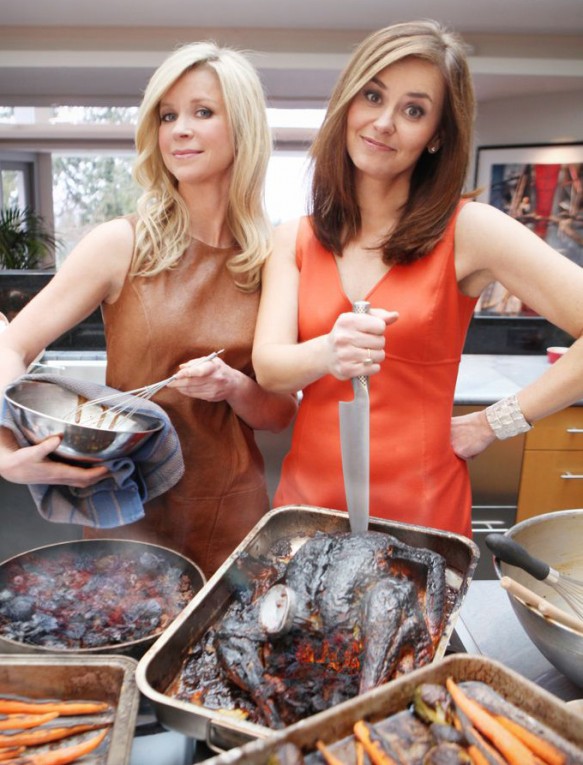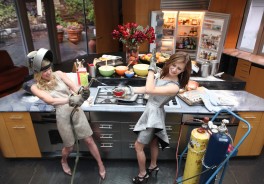
How To Get Your Own TV Show
If there’s one thing I get asked advice about (besides where to go in Croatia) it's how to get a TV show off the ground. Anna and I have received countless emails and queries about this, with people asking if they can pick our brains about the TV world.
While getting your own TV show is never easy, I believe that today it’s even more difficult. TV budgets are shrinking, broadcasters are more exacting and big concepts and big personalities are mandatory.
I can’t speak to what it takes to get a scripted program off the ground, but here are my tips for those looking to delve into the unscripted realm.
WATCH TV
The best part of being in TV is that you’re supposed to watch TV! Also known as doing your research. It makes me crazy when people who want to work in this industry say they don’t have cable or don’t have the time or inclination to watch TV. Kind of like the therapist saying “yeah, people really bug me.”
Thanks to the Internet, doing your research is easier than ever before. You probably have some idea of the kind of show you want to do. Be sure to watch everything in your genre, even if it’s just for one episode. Make note of what you like and what you don’t and most importantly, where the program is airing. This will be critical at the pitching stage.
Testing Cleaning Products on The Shopping Bags
COME UP WITH A (SOMEWHAT) ORIGINAL CONCEPT
When we came up with The Shopping Bags concept, finding information about what products to buy was not as ubiquitous as it is today. It was 1999 after all!
If you can come up with a show that no one has ever thought of before, one that people will actually want to watch, kudos to you. More likely, you will need to put a new spin on a common subject matter, say food, interior design, or a competition type show. Want to do a show about two friends cooking in the kitchen? You better have some sort of unique angle or …
FIND GOOD CHARACTERS
You will need larger than life characters to populate your project, people like Gordon Ramsey, Duck Dynasty, Honey Booboo and Housewives of everywhere. OR you’ll need to cast likeable and charismatic characters, like Giadia De Laurentiis, Jamie Oliver or the Property Brothers. When we were finding experts for our shows, we went for the biggest and most dynamic guests we could land. Doesn’t get much more over-the-top than Janice Dickinson who appeared on an episode of Anna and Kristina’s Beauty Call.
Increasingly, broadcasters are looking for hosts who are integral to the story. Jeremy Wade, the host of River Monsters, is a biologist and an angler. Clearly not just anyone could do his job and he’s part of the story.
The exception is hosts of a reality or game show, like Jeff Probst of Survivor or Jon Montgomery of Amazing Race Canada. These hosts don’t get involved in the action. But notice, they’re usually well-established if not already famous themselves. Still, the rest of the cast better be dynamic and interesting to watch.
You want to host our own show? If don’t have a big personality, if you have little TV experience or if you don’t have a super cool or unique thing that you do, you have some big hurdles ahead of you.
ASK QUESTIONS
When Anna and I left news to follow our dream of having our own show, we knew a fair bit about hosting, researching and storytelling. But we didn’t know much about financing projects or running a production company. We learned quickly that no one person can or will give you the blueprint to TV success, let alone a budget. So it’s important to talk to everyone you can think of who could potentially offer some guidance. Ask for half an hour of their time and offer to take them out for coffee. (Or, read this blog!)
The Grocery Bag Season One Team at the Leo Awards
GO TO INDUSTRY EVENTS
If you don’t know the right people (or even if you do) it pays to attend industry events to meet even more people. Join organizations – Women in Film and TV for example – take classes, and when you’re ready, attend a conference. This is where you’ll come face to face with other producers and broadcasters. I recommend going to one even before you’re ready to pitch as they offer many valuable seminars, live pitching sessions, and round table discussions with decision makers. Soak it all up. The Banff Media Festival and Real Screen are two popular such conferences.
Yak yak yak on the Grouse Grind
PERFECT YOUR ELEVATOR PITCH
You should be able to explain your show concept in one or two sentences. Grey’s Anatomy is an hour-long drama about interns working at a Seattle Hospital. The Walking Dead is drama about a group of men and women who struggle to survive after a zombie apocalypse. American Idol is a cross-country talent search for the best singer. You get the idea.
Once you’ve piqued a decision-maker’s interest, then you can go into more detail. If they like what they hear, you may be asked to provide a “one pager.” It’s called that for a reason. It should include what the show is about, how an episode plays out, the target audience (do not say everyone), and why will they want to watch it.
I could write a few more blogs about pitching tips but one of the biggest piece of advice I can offer is pitch the right program to the right broadcaster. Nothing irritates them more than hearing an idea about a show they’d never air, one that isn’t appropriate for their network. (Go back to point #1.)
 On set for Anna and Kristina Beauty Call
On set for Anna and Kristina Beauty Call
PARTNER UP
If you’re new to the business, no broadcaster will give you thousands of dollars to produce your first TV show. Chances are they will want you to partner up with a reputable production company who can provide the experience and infrastructure to give your broadcast partner ease of mind.
If you don’t want to go this route, be prepared to hire knowledgeable producers, accountants, writers and lawyers to join your team. Either way, you’ll likely need to produce a short demo or a pilot first. Very few ideas go directly to series.
Fishing for Anna and Kristina’s Grocery Bag
KNOW WHEN TO HOLD ‘EM AND WHEN TO FOLD ‘EM
It can take a very long time from show idea to air. Likely a year or more. You’ll need a special blend of persistence, self-assurance and belief in the project to make it through.
We’ve all heard the stories of people like author J. K. Rowling who was rejected repeatedly before signing her first book deal for Harry Potter. So yes, tenacity is important. But don’t let your commitment be misguided either. Not every idea is viable, affordable, doable or well-timed. If it’s taking years and you have little or no nibbles, it may be time to move on.
Hope this helps and let me know when to set my PVR!















